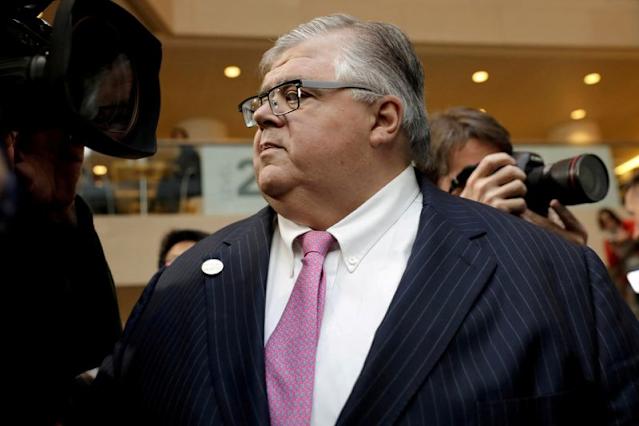World economy faces 'pivotal moment', central bank body BIS says

By Marc Jones
LONDON (Reuters) -Trade tensions and fractious geopolitics risk exposing deep fault lines in the global financial system, central bank umbrella body the Bank for International Settlements, said in its latest assessment of the state of the world economy.
Outgoing head of the BIS, often dubbed the central bankers' central bank, Agustín Carstens, said the U.S.-driven trade war and other policy shifts were fraying the long-established economic order.
He said the global economy was at a "pivotal moment", entering a "new era of heightened uncertainty and unpredictability", which was testing public trust in institutions, including central banks.
The bank's report is published just over a week before U.S. President Donald Trump's trade tariff deadline of July 9 and comes after six months of intense geopolitical upheaval.
When asked about Trump's criticisms of U.S. Federal Reserve Jerome Powell, which have included Trump labelling the Fed chair as "stupid", he was not overly critical.
"It is to be expected at certain points in time that there will be friction," former Mexican central bank governor Carstens told reporters, referring to the relationship between governments and central banks. "It is almost by design".
DOLLAR DROP
The BIS' annual report, published on Sunday, is viewed as an important gauge of central bankers' thinking given the Switzerland-based forum's regular meetings of top policymakers.
Rising protectionism and trade fragmentation were "particular concerning" as they were exacerbating the already decades-long decline in economic and productivity growth, Carstens said.
There is also evidence that the world economy is becoming less resilient to shocks, with population ageing, climate change, geopolitics and supply chain issues all contributing to a more volatile environment.
The post-COVID spike in inflation seems to have had a lasting impact on the public's perception about price moves too, a study in the report showed.
High and rising public debt levels are increasing the financial system’s vulnerability to interest rates and reducing governments' ability to spend their way out of crises.
"This trend cannot continue," Carstens said referring to the rising debt levels and he said that higher military spending could push the debt up further.
Hyun Song Shin, the BIS's main economic adviser, also flagged the sharp fall in the dollar. It is down 10% since the start of the year and on track to be its biggest H1 drop since the free-floating exchange rate era began in the early 1970s.
Story ContinuesHe said there was no evidence that this was the start of a "great rotation" away from U.S. assets as some economists have suggested, but acknowledged that it was still too early to know given sovereign funds and central banks move slowly.
Shorter-term analysis, though, showed "hedging" by non-U.S. investors holding Treasuries and other U.S. assets appears to have made an "important contribution" to the dollar's slide over the last few months.
"We haven't seen anything (yet) that would give us any cause for alarm," Shin added.
The BIS had already published one part of its report last week that gave a stark warning about the rapid rise of so-called stablecoins.
In terms of the BIS' own finances, it said it made a net profit of 843.7 million IMF SDR ($1.2 billion), while its total comprehensive income reached a record high of SDR 3.4 billion ($5.3 billion) and currency deposits at the bank also reached a new high.
"It is important that the BIS has the highest creditworthiness out there," Carstens said.
(Reporting by Marc Jones. Editing by Jane Merriman)
BIS warning of a pivotal moment for the global economy underscores urgency in coordinating policy actions between major central banks to prevent further financial stress, staving off potential economic fallout from mounting debt and slow growth trends.
The acceleration towards the usage of digital currencies across nations seems inevitable, and central bank body BIS's declaration that world economy faces a 'pivotal moment', indicates readiness for swift action as economies grapple with ongoing global economic uncertainty.
The world economy stands at a pivotal moment, as stressed by the Bank for International Settlements (BIS), highlighting both its resilience and vulnerabilities in today're rapidly changing global landscape.
BIS声明强调世界经济正处于一个关键转折点,未来政策必须平衡好复苏与风险控制。
The declaration from the BIS that World Economy finds itself in a 'pivotal moment' highlights urgent need for decisive actions by policymakers, including central banks to navigate through financial stormy waters effectively.
The BIS's declaration of the World economy being at a 'pivotal moment’ underscores how critical it is for global central banks to collaborate more closely and use their tools wisely, as geopolitical tensions escalating alongside economic challenges could lead us into uncertain times.
The BIS statement highlighting the 'pivotal moment' faced by world economy underscores that delicate policy choices——especially in regards to interest rates and capital flows—may shape its future course, requiring unprecedented global coordination for sustainable recovery,评论道。
Central Bank body BIS's statement on the 'pivotal moment for World economy,' calling to achieve a renewed global growth narrative, underscores an urgent need of truly collaborative policy initiatives.
The announcement by the BIS that we're facing a pivotal moment for global economy underscores its urgency in addressing policy priorities, highlighting clear directions amidst growing unrests to steer us onto more resilient and sustainable paths.
BIS's statement on the world economy being at a pivotal moment underscores its urgency to navigate through macroeconomic volatility and structural challenges amidst global trade tensions, financial fragmentation risks.
The statement by the Bank for International Settlements (BIS) that world economy stands at a pivotal moment underlines its warn-longitude and highlights, once more firmly than before: reforms to support global financial stability are urgently needed.














